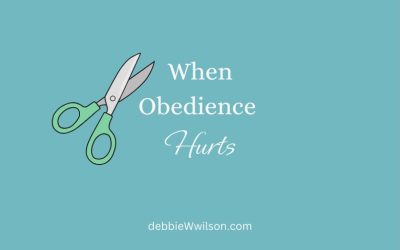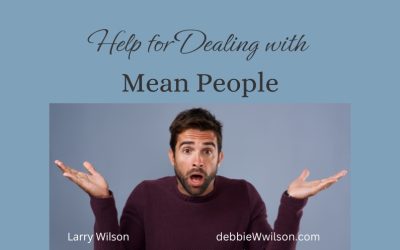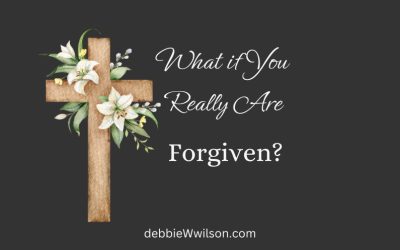You forgave, but they never apologized or changed. How do you treat them going forward? How do you handle someone you’ve forgiven but don’t trust? What do you do when you want a healthy relationship, but they don’t?
When we think someone is wrong, we want to help them see the light, change their ways—and stop hurting us! We prefer handling someone else to corralling our own impulses and strong emotions. But God didn’t give us the power to transform them. The Holy Spirit produces self-control (Gal. 5:22-23).
We only frustrate ourselves when we focus on changing someone else. It is better to accept responsibility for what we can manage—ourselves.
We’ve worked our way through the process of forgiveness by spelling FREEDOM. The M in FREEDOM stands for: Manage yourself.
The day we learn to take responsibility for ourselves and release the other person to God is our liberation day.
Each of us will give an account of ourselves to God,” (Romans 14:12, NIV).
God won’t ask me why someone behaved a certain way. He’ll ask me about my actions. Next time we’ll look at how to interact with wrongdoers. Now, let’s lay some groundwork for managing ourselves.
Keep a Clean Heart and Clear Boundaries
It’s not unusual for one who wronged you to stay in your circles. They show up at family reunions, attend the same church, or work in the same building. Protect your heart by always forgiving offenses and setting healthy boundaries.
We don’t have to approach the wrong-doer to forgive them. Forgiveness is between us and God. The perpetrator may deny the wrong, blame us, or turn on us in full force.
A woman who heard me speak on forgiveness said, “When you said I didn’t have to approach the person who wronged me, I knew I wanted to forgive my dad. He sexually abused my sister and me for years.
“Because I couldn’t broach the subject with him, I believed I could never forgive him. I forgave him that night. He called sometime later, and I was able to talk to him without knots in my stomach for the first time in my adult life.”
You don’t have to interact with an unsafe person to forgive. In fact, it’s usually wise not to engage with them.
Forgiveness Differs from Reconciliation
Forgiveness doesn’t necessarily restore a relationship. God tells us to forgive everyone. This protects us from the havoc resentment creates in us and spills out on those we love. But reconciliation takes the cooperation of both parties.
Romans 12:18, (NIV) says, “If possible, as far as it depends on you, live at peace with everyone.” A restored relationship is ideal. But we can’t reconcile with everyone. Even Jesus suffered rejection from people He sought a relationship with.
Jerusalem, Jerusalem, you kill the prophets and stone to death those sent to you! How often I wanted to gather your children together the way a hen gathers her chicks under her wings! But you were not willing! (Luke 13:34 GW).
Jesus could not live at peace with the hypocritical Pharisees and still be in sync with His Father. How can “me and my house serve the Lord,” and tolerate sin at the same time? (I cover this in more detail in the chapters on Bathsheba in Little Women, Big God.)
It is impossible to enjoy peace with people who continue to willfully wrong us and sin against God. But a lack of relationship should be because of their sin, not because of our resistance to forgive one who’s shown genuine repentance.
It is impossible to enjoy peace with people who continue to willfully wrong us. #wisdom, #forgive Share on XIf a person doesn’t want to be close to you, let them go. Remain open to reconciliation, but don’t force it.
We’ll continue our series next time by looking at how to use discernment in sticky relationships. In the meantime, keep and a clean heart and know your boundaries.
Blessings,
Resources
Boundaries by Henry Cloud and John Townsend
The forgiveness series begins here.
Click here for How to Rebuild Broken Trust, the next post in this series.
Sometimes I link with these great sites:
#Kelly Balarie & Friends, #Recharge Wednesday, #TuneinThursaday, #HeartEncouragment #Dance with Jesus, #FreshMarketFriday, #Grace&Truth, #Faith ‘n Friends
Photo by Vitaly Ustimenko on Unsplash
We participate in the Amazon Services LLC Associates Program, an affiliate advertising program designed to provide a means for us to earn fees by linking to Amazon.com and affiliated sites. This doesn’t add any cost to the purchase.





This series reminds me of some of the good things written by Lewis Smedes on forgiveness. I especially like his book, The Art of Forgiving, and wonder if you have read it. Thanks for patiently leading us all through this topic, Deb.❤️
Pam, I have not read that. Thanks for sharing this resource. This series came from a talk I did many years ago and the blogs I later did on it. Scriptures, my own struggles, and counseling those who struggled to forgive along with sermons I heard along the way, Neil Anderson’s work, and Cloud and Townsend’s Boundaries book influenced me. Thanks for reading.
“a lack of relationship should be because of their sin, not because of our resistance to forgive one who’s shown genuine repentance.” This was SUCH a great insight and something too often overlooked. There is a huge difference between forgiveness and reconciliation. Thank you for sharing Debbie.
Thank you, Ann. I believe this is an important difference to note. Many won’t forgive because they believe they must be in relationship with an unsafe person.
Thank you for explaining the difference in forgiving a person and being in a relationship with that UNSAFE person . I have struggled with this for sometime in how do you love someone, but yet love yourself when that other individual is unsafe. Love at a distance!
Yes, Carolyn, they are different. We’ll talk more about this issue in the next couple of blogs.
Wonderful! Can’t wait to receive it.
I have learned that just because I forgive someone doesn’t mean they are going to change their behavior. The forgiveness is for me. God softens my heart and allows me to forgive. I am thankful God forgives me.
Melissa, expecting the other person to change keeps us in a state of confusion and hurt when they don’t. But they are God’s responsibility. We forgive and set healthy boundaries. And yes, I’m glad He forgives me!
Thank you for your teachings on forgiveness and reconciliation in this post. “Now all these things are from God, who reconciled us to Himself through Christ and gave us the ministry of reconciliation,”
2 CORINTHIANS 5:18 NASB
Hi Debbie,
Loved “The day we learn to take responsibility for ourselves and release the other person to God is ‘our’ liberation” day.”
Thank you Sara. A simple but challenging lesson
I’m glad Paul wrote Romans 12:18 because that reminds us that we can only do our part. We cannot make another person be a peace with us, but we can obey God and do what is necessary in our own hearts to avoid the strife that unforgiveness causes in our souls.
I’m glad he wrote that too, Barbara. The Bible is realistic. Thanks for your comment.
It’s so freeing to forgive others, but we do need healthy boundaries moving forward. I know that I was able to forgive some people for some awful things once I knew that God’s justice would prevail in the end. God forgave me when I didn’t deserve it. I could forgive them too.
Jennifer, we do need both. If we don’t have healthy boundaries we put ourselves in a position to become bitter.
Your post caught my eye because I just launched my Bible study/memoir on this same topic in April (Unlocked Hearts, Unleashed Joy ~ Forgiveness Is the Key). Forgiving another person for the pain they’ve inflicted on us, or asking for forgiveness for the hurt we’ve caused another is like surfacing after being under water and taking in a deep breath. It’s a refreshing, indescribable joy that results from letting go, so we can move forward in freedom. Thank you for sharing.
What a wonderful analogy, Melanie. And congratulations on you new book! Thanks for sharing your title with my readers.
I really appreciate your series on forgiveness, Debbie. Especially this post. Years ago, I was struggling with forgiving this one person. I whined to God saying that other person isn’t even sorry. That person does not care one bit about forgiveness or relationship. When I quieted down, God spoke to my heart saying that my forgiveness is not for that relationship, but my relationship with Him. My choice to not forgive hindered my relationship with my heavenly Father. Seeing it that way changed my heart. I never want to let anyone have that kind of power over my relationship with God.
Thanks for sharing on Grace & Truth!
Wow, Aimee, what an amazing insight and motivation to forgive. And it is so true. It affects our relationship with Christ, ourselves, and people we do want a relationship with. Bitterness can’t be contained. Thanks for sharing!